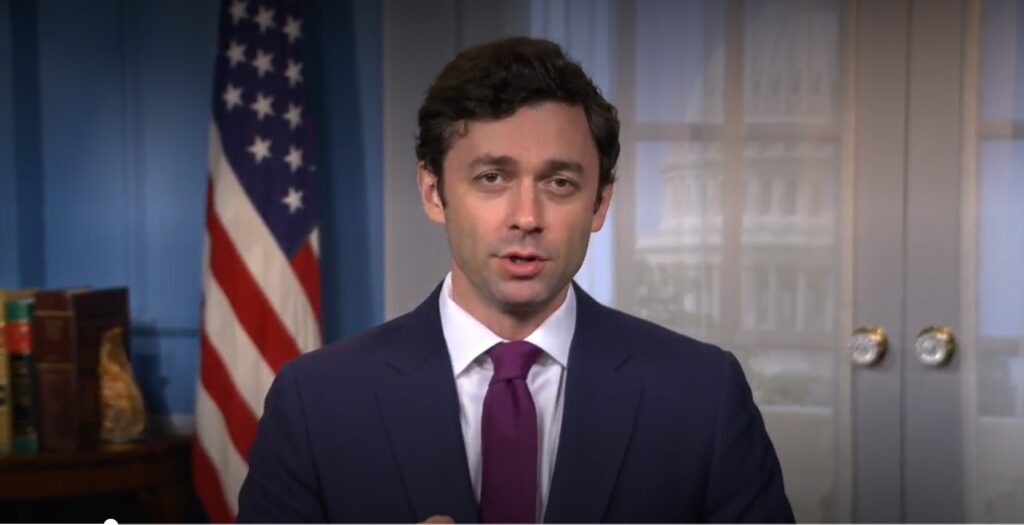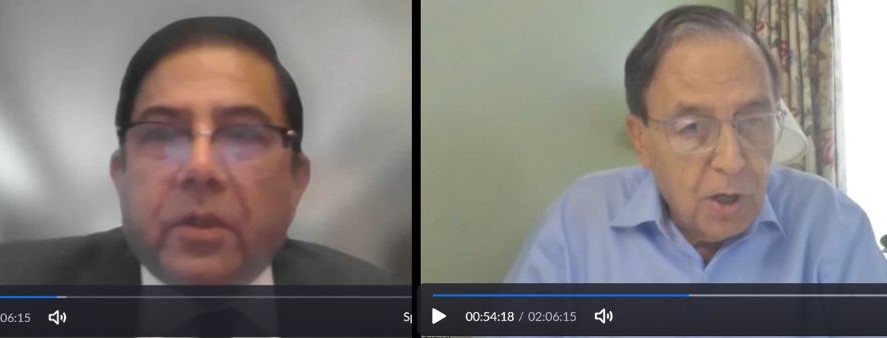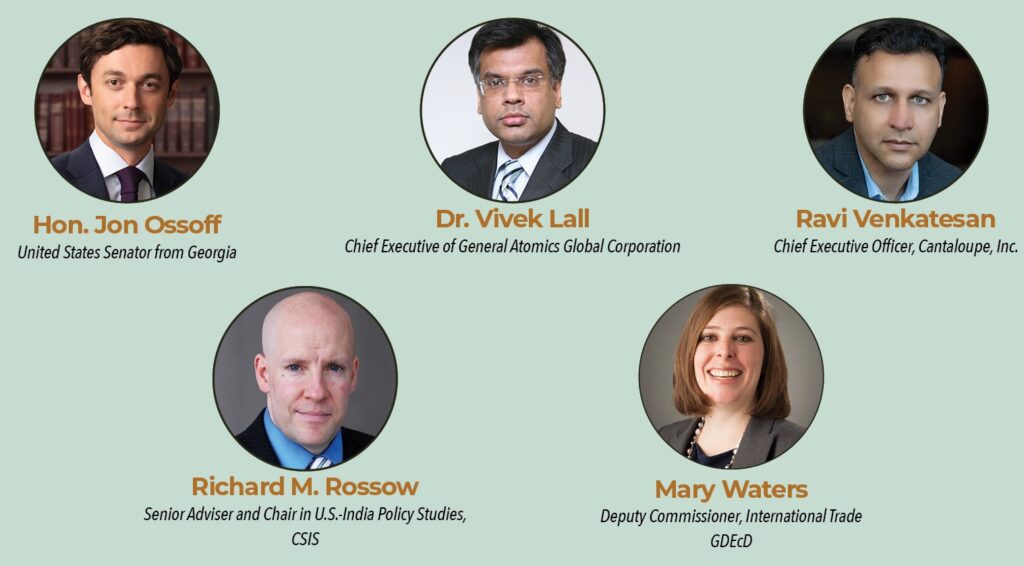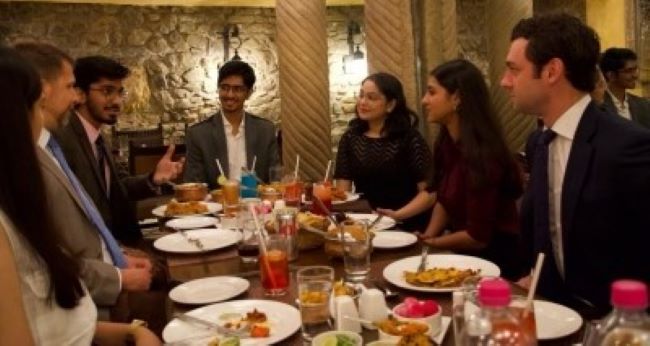Cover photo: Senator Jon Ossoff talking to students of Jai Hind College, Mumbai during his visit to India. File photo for representation purposes only.
BY VEENA RAO
Atlanta, GA, August 16, 2023: In a bid to strengthen economic ties and promote collaborative ventures between the United States and India, the US-India Business Summit (UIBS) joined forces with Georgia Tech’s Center for International Business Education and Research (GT CIBER) to host a virtual conference. The event, titled “Growing US-India Business Connections,” took place on August 8, 2023, drawing participants from across industries.
Anchored by Ani Agnihotri, the founder of UIBS, and Dr. John McIntyre, Executive Director of GT CIBER, the virtual conference aimed to carve out new avenues for business collaboration between the two economic powerhouses.

US Senator Jon Ossoff sent his best wishes for the conference through a streaming video.
“I had the pleasure of leading an economic delegation to India last year. And I am a staunch advocate for strengthening commercial and cultural ties between Georgia and India,” he said, adding that it was a pleasure a few weeks ago, to host PM Modi at the US Capitol for a joint address to the Congress.
“Whenever and however I can be of assistance to entrepreneurs and firms in GA who are looking to build commercial ties between Georgia and our Indian partners, please reach out to my office. My economic policy leader’s name is Samantha Lucas,” he concluded.

Prominent experts from various sectors weighed in on the ever-growing economic relationship between the United States and India. The speakers delved into the intricacies of bilateral partnerships, technological collaborations, cultural understanding, and the multifaceted challenges that businesses encounter when seeking to expand their operations in the dynamic Indian market.

Mary Waters: Paving the Path for International Trade
Mary Waters, the Deputy Commissioner of International Trade for the Georgia Department of Economic Development (GDEcD), kicked off the discourse by providing a comprehensive understanding of the department’s role in supporting businesses. She underscored that the GDEcD serves as the vanguard for sales and marketing for the state of Georgia, facilitating informed investment decisions for companies.
Waters reiterated that the sustained economic vitality of Georgia hinges on robust international partnerships. She emphasized the Department’s commitment to providing resources that enable businesses to overcome obstacles and tap into global opportunities. She highlighted India’s meteoric rise as a significant bilateral partner for Georgia, with bilateral trade figures doubling within a mere two years. She identified sectors like aviation, automotive, medical devices, and energy technologies as hotbeds for mutually beneficial trade and collaboration.
Vivek Lall: Charting a Path to Technological Synergy
Vivek Lall, the CEO of General Atomics Global Corporation, added a layer of technical depth to the dialogue by emphasizing the need for cooperation between the United States and India in high-tech domains. Lall underscored the impact of successful collaboration in areas such as national defense, energy, space, and cybersecurity. He elucidated how these collaborations can pave the way for joint efforts in domains like health, education, and climate change.
With insights into intelligence sharing and the critical role of artificial intelligence and machine learning, Lall highlighted the significance of safeguarding data in a rapidly digitizing world. The speech underscored how these collaborations are not just confined to the economic realm but have far-reaching implications for international political, economic, and social dynamics.
Ravi Venkatesan: Building Bridges through Cultural Understanding
Ravi Venkatesan, the CEO of Cantaloupe, Inc., introduced a nuanced perspective, focusing on the importance of understanding cultural differences and leveraging strengths for a more cohesive US-India relationship. Venkatesan emphasized the interplay of geopolitical factors and the need to navigate the complexities of the global landscape.
Addressing the trend of strengthening bilateral relationships against the backdrop of multilateral challenges, Venkatesan advocated for reinvigorating cultural education to promote mutual understanding. He pointed out the significance of soft power in enhancing cultural understanding and underscored the importance of learning from China’s role in geopolitics. His speech touched upon the strengths and weaknesses of both nations and highlighted the opportunities for collaboration in the technology-driven sectors.
Richard Rossow: Tracing the Evolution of Economic Ties
Richard Rossow, a Senior Adviser at the Center for Strategic and International Studies (CSIS), provided historical context to the evolving economic relationship between the United States and India. Rossow’s speech delved into the progress achieved since India’s nuclear tests and how it paved the way for a comprehensive engagement between the two nations.
The speech dissected the Modi government’s policies and reforms, spotlighting liberalized foreign direct investment (FDI) regulations, Prime Minister Modi’s active engagement with foreign investors, and significant domestic economic reforms. Rossow analyzed the trajectory of US-India trade relations, exploring the role of IT services, manufacturing potential, and urbanization in shaping the economic landscape.
Challenges and Opportunities for Businesses Expanding in India
In a section that resonated with business leaders and entrepreneurs, the speeches turned to the practical aspects of expanding into the Indian market. The speakers collectively addressed the challenges and opportunities that businesses encounter, delving into legal intricacies, regulatory coherence, corruption, infrastructure limitations, the evolving political landscape, and social challenges.
While acknowledging the intricacies of India’s legal system and the challenges of resolving disputes, the speakers highlighted the need to maintain strong relationships with business partners to navigate such obstacles. They discussed the regulatory landscape’s nuances and emphasized the necessity for stability in regulations, especially in response to global economic shifts.
Corruption emerged as a candid topic, with speakers acknowledging its existence and discussing its impact on licensing, land clearance, and regulatory procedures. Digitization’s role in enhancing transparency and curbing corruption was emphasized as a positive step.
Infrastructure emerged as a focal point, encompassing challenges such as high electricity costs, inconsistent quality, and suboptimal logistics. However, speakers noted that the attraction of India’s substantial domestic market is prompting companies to consider manufacturing operations in the country.
The speakers addressed the political landscape’s potential impact on businesses and highlighted the risks associated with social unrest in urban slums. Amidst these challenges, the optimism for trade potential and growth in US-India relations remained palpable.
Conclusion: Navigating the Path Ahead
The panelists collectively provided a comprehensive and multidimensional view of the evolving economic relationship between the United States and India. The discussions spanned from the grassroots of fostering international trade to the intricacies of high-tech collaborations and cultural understanding. While acknowledging challenges ranging from regulatory complexities to infrastructure limitations, the speakers emphasized the immense opportunities for collaboration in crucial sectors and mutual trade growth.
The discussion encapsulated the multifaceted nature of the US-India economic partnership, underlining the need for understanding cultural nuances, leveraging strengths, and addressing weaknesses. The insights shared by these experts are poised to contribute significantly to fostering a more robust and sustainable economic relationship between the two nations in the years to come.





